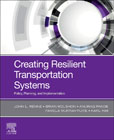
Creating Resilient Transportation Systems: Policy, Planning and Implementation
Renne, John
Wolshon, Brian
Murray-Tuite, Pamela
Pande, Anurag
Kim, Karl
The latest strategies for overcoming transportation vulnerabilities to create more resilient cities. Drawing on the latest research Creating Resilient Transportation Systems: Policy, Planning and Implementation demonstrates how the transportation sector is a leading producer of carbon emissions, resulting in climate change and extreme weather disruptions and disasters in cities. Renne, Wolshon, Murray-Tuite, Pande, and Kim go on to show how to minimize the transportation impacts associated with these urban disasters, showing how to return transportation systems to at least status quo in the shortest feasible time. Assesses the short and long term impacts of transportation systems on the natural environment at local, regional, and global scalesExamines transportation systems in relation to risk, vulnerability, adaptation, mitigation, sustainability, climate change, and livabilityShows how urban transportation investments in transit, walking, and bicycling result in significantly lower per capita carbon emissions as compared to investing in sprawling, automobile dependent regions INDICE: 1. Introduction 2. Defining Resilience 3. Multimodal Transportation Systems 4. Engineering and System Design 5. Increasing Transportation Network Resilience 6. Disaster Risk Reduction and Resilience: International Perspectives 7. Traveler Adaptation to Transportation Disruptions 8. Measuring and Assessing Resilience 9. Resilience, Automation and Connected Vehicles 10. Overcoming Challenges of the 21st and 22nd Centuries
- ISBN: 978-0-12-816820-2
- Editorial: Elsevier
- Encuadernacion: Rústica
- Páginas: 244
- Fecha Publicación: 01/09/2019
- Nº Volúmenes: 1
- Idioma: Inglés
